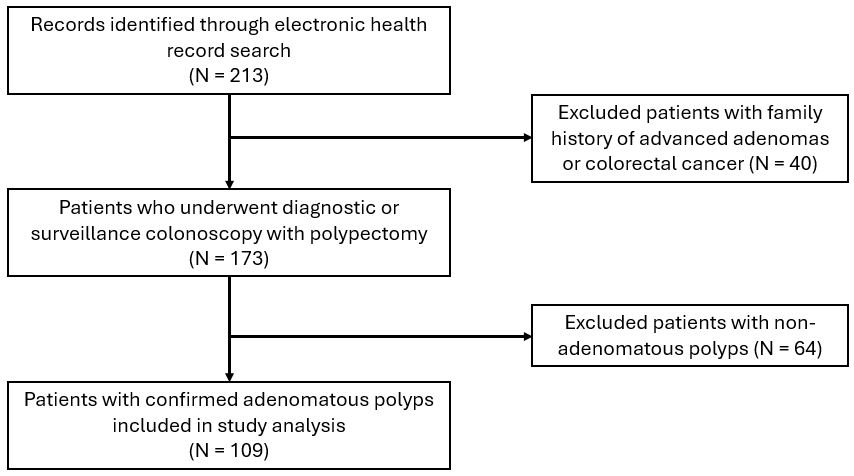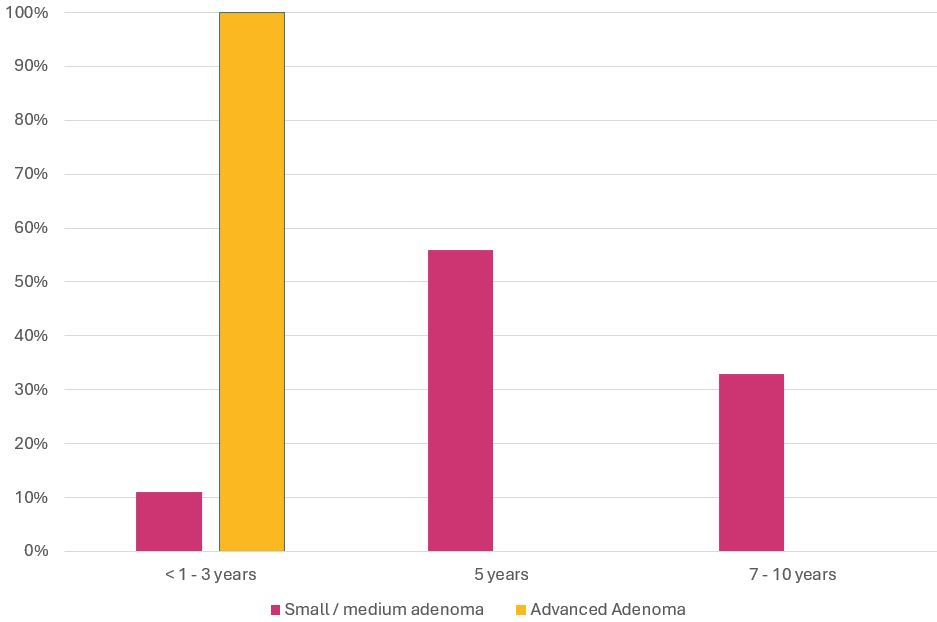Monday Poster Session
Category: Colorectal Cancer Prevention
P2638 - Assessment of Surveillance Colonoscopy Practices in Patients With Young-onset Adenomatous Colon Polyps - A Quality Improvement Project in a Tertiary Academic Gastroenterology Practice
Monday, October 27, 2025
10:30 AM - 4:00 PM PDT
Location: Exhibit Hall
- MC
Mark Cromer, MD
Prisma Health Greenville Memorial Hospital
Greenville, SC
Presenting Author(s)
Mark Cromer, MD, Aaron Rampersad, DO, Lauren McAbee, MPH, Anjani Jammula, MD
Prisma Health Greenville Memorial Hospital, Greenville, SC
Introduction: Recent studies have demonstrated increasing incidence of early-onset colorectal cancers (CRCs) and prevalence of young-onset adenomas (YOAs) – cancers/adenomas found in patients < 50 years old. YOAs, particularly advanced adenomas, carry an increased risk of CRC. Current U.S. Multi-Society Task Force guidelines only apply to those age > 45 years and do not address patients with YOAs, leading to marked variability in surveillance interval recommendations, perhaps from uncertainty and over-precaution. This study analyzed a tertiary academic gastroenterology division’s CRC surveillance pattern for patients with YOAs.
Methods: We identified individuals 18 to 44 years old who underwent colonoscopy with polypectomy and pathology-confirmed adenoma between May 2024 - May 2025. Patients with non-adenomatous polyps, inflammatory bowel disease, CRC, or family history of CRC, advanced adenomas, or hereditary polyposis syndromes were excluded. Collected data included: patient demographics; adenoma size, type, location, and number; recommended surveillance colonoscopy interval; and other colonoscopy quality metrics.
Results: One-hundred and nine patients were included. The median age was 39 years. Rectal bleeding/hematochezia were the most common indications (35%). Fourteen (13%) patients were undergoing a surveillance colonoscopy for prior adenomas, 60% had adenomas beyond the left colon, and 30 (28%) had an advanced adenoma (size >10mm, tubulovillous adenoma, or high-grade dysplasia). Eighteen (17%) did not have a documented surveillance colonoscopy recommendation; of these 3 (17%) had advanced adenomas. For patients with advanced adenomas, all (100%) surveillance colonoscopy recommendations were < 3 years. For patients with 1-2 small adenomas (< 9mm), 57 (89%) recommended surveillance colonoscopy was > 5 years.
Discussion: Our group had nearly 90% compliance with national guidelines on colonoscopy surveillance recommendations. Studies have indicated that endoscopists noncompliant with guidelines usually recommend surveillance too early, but current data has demonstrated no difference in the risk of advanced neoplasia on repeat colonoscopy for young vs older patients ( > 50 years). Identified areas for improvement in our center include documentation of guideline-oriented CRC surveillance intervals and bowel prep adequacy. Further research is needed to understand if patients with YOA should receive surveillance recommendations outside of current guidelines for older patients.

Figure: Figure 1: Study selection flow diagram

Figure: Figure 2: Recommended surveillance colonoscopy intervals by adenoma type
All patients with advanced adenomas were recommended surveillance colonoscopy less than or equal to 3 years. For patients with small / medium adenomas, recommended surveillance intervals were 11% at less than or equal to 3 years, 56% at 5 years, and 33% at 7-10 years.
Legend:
Y-axis = percent out of the total number of patients with a recommended surveillance interval per group.
X-axis = recommended colonoscopy surveillance intervals.
Small / medium adenomas = size less than or equal to 9mm.
Advanced adenomas = size greater than or equal to 10mm, tubulovillous adenoma, or adenoma with high-grade dysplasia.
Disclosures:
Mark Cromer indicated no relevant financial relationships.
Aaron Rampersad indicated no relevant financial relationships.
Lauren McAbee indicated no relevant financial relationships.
Anjani Jammula indicated no relevant financial relationships.
Mark Cromer, MD, Aaron Rampersad, DO, Lauren McAbee, MPH, Anjani Jammula, MD. P2638 - Assessment of Surveillance Colonoscopy Practices in Patients With Young-onset Adenomatous Colon Polyps - A Quality Improvement Project in a Tertiary Academic Gastroenterology Practice, ACG 2025 Annual Scientific Meeting Abstracts. Phoenix, AZ: American College of Gastroenterology.
Prisma Health Greenville Memorial Hospital, Greenville, SC
Introduction: Recent studies have demonstrated increasing incidence of early-onset colorectal cancers (CRCs) and prevalence of young-onset adenomas (YOAs) – cancers/adenomas found in patients < 50 years old. YOAs, particularly advanced adenomas, carry an increased risk of CRC. Current U.S. Multi-Society Task Force guidelines only apply to those age > 45 years and do not address patients with YOAs, leading to marked variability in surveillance interval recommendations, perhaps from uncertainty and over-precaution. This study analyzed a tertiary academic gastroenterology division’s CRC surveillance pattern for patients with YOAs.
Methods: We identified individuals 18 to 44 years old who underwent colonoscopy with polypectomy and pathology-confirmed adenoma between May 2024 - May 2025. Patients with non-adenomatous polyps, inflammatory bowel disease, CRC, or family history of CRC, advanced adenomas, or hereditary polyposis syndromes were excluded. Collected data included: patient demographics; adenoma size, type, location, and number; recommended surveillance colonoscopy interval; and other colonoscopy quality metrics.
Results: One-hundred and nine patients were included. The median age was 39 years. Rectal bleeding/hematochezia were the most common indications (35%). Fourteen (13%) patients were undergoing a surveillance colonoscopy for prior adenomas, 60% had adenomas beyond the left colon, and 30 (28%) had an advanced adenoma (size >10mm, tubulovillous adenoma, or high-grade dysplasia). Eighteen (17%) did not have a documented surveillance colonoscopy recommendation; of these 3 (17%) had advanced adenomas. For patients with advanced adenomas, all (100%) surveillance colonoscopy recommendations were < 3 years. For patients with 1-2 small adenomas (< 9mm), 57 (89%) recommended surveillance colonoscopy was > 5 years.
Discussion: Our group had nearly 90% compliance with national guidelines on colonoscopy surveillance recommendations. Studies have indicated that endoscopists noncompliant with guidelines usually recommend surveillance too early, but current data has demonstrated no difference in the risk of advanced neoplasia on repeat colonoscopy for young vs older patients ( > 50 years). Identified areas for improvement in our center include documentation of guideline-oriented CRC surveillance intervals and bowel prep adequacy. Further research is needed to understand if patients with YOA should receive surveillance recommendations outside of current guidelines for older patients.

Figure: Figure 1: Study selection flow diagram

Figure: Figure 2: Recommended surveillance colonoscopy intervals by adenoma type
All patients with advanced adenomas were recommended surveillance colonoscopy less than or equal to 3 years. For patients with small / medium adenomas, recommended surveillance intervals were 11% at less than or equal to 3 years, 56% at 5 years, and 33% at 7-10 years.
Legend:
Y-axis = percent out of the total number of patients with a recommended surveillance interval per group.
X-axis = recommended colonoscopy surveillance intervals.
Small / medium adenomas = size less than or equal to 9mm.
Advanced adenomas = size greater than or equal to 10mm, tubulovillous adenoma, or adenoma with high-grade dysplasia.
Disclosures:
Mark Cromer indicated no relevant financial relationships.
Aaron Rampersad indicated no relevant financial relationships.
Lauren McAbee indicated no relevant financial relationships.
Anjani Jammula indicated no relevant financial relationships.
Mark Cromer, MD, Aaron Rampersad, DO, Lauren McAbee, MPH, Anjani Jammula, MD. P2638 - Assessment of Surveillance Colonoscopy Practices in Patients With Young-onset Adenomatous Colon Polyps - A Quality Improvement Project in a Tertiary Academic Gastroenterology Practice, ACG 2025 Annual Scientific Meeting Abstracts. Phoenix, AZ: American College of Gastroenterology.
